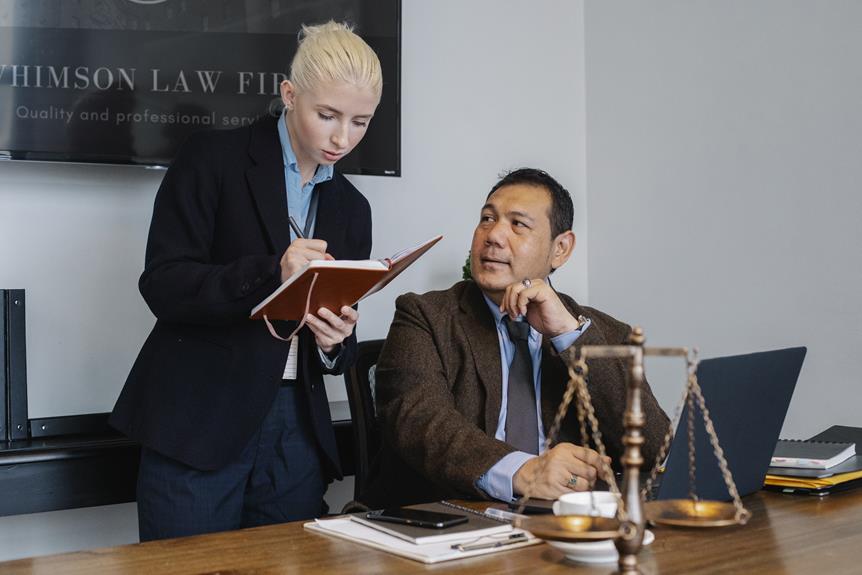Professionalism Matters: How Attorney Behavior Impacts Your Legal Case
Navigating workers' compensation claims can be a complex journey, often made more challenging by uncooperative attorneys. This article highlights situations where an attorney's conduct may necessitate their dismissal, explores common workplace injuries, and provides insight into professions prone to workplace accidents. It aims to equip you with the necessary knowledge to handle a "Professionalism Matters: How Attorney Behavior Impacts Your Legal Case"

Key Takeaways
- Lack of communication and poor guidance from the attorney can cause confusion and frustration for clients.
- Attorneys who act unprofessionally and are not respected by peers and court staff may struggle to negotiate settlements and obtain favorable results.
- Unclear billing practices, including vague descriptions and unexpected bills, can lead to dissatisfaction and lack of trust in the attorney-client relationship.
- Cases that are primarily handled by paralegals instead of the attorney may result in inadequate representation and limited involvement from the attorney.
Recognizing the Problems With Your Current Attorney
In order to ensure optimal representation in your workers' compensation claim, it is crucial to pick up on any signs of problems with your current attorney, such as lack of communication, unprofessional behavior, unclear billing practices, dishonesty, or over-reliance on paralegals. Recognizing these signs early on can save you significant time, money, and frustration. These issues can impede your case's progress and compromise your potential benefits. A reliable, professional attorney is key to a successful workers' compensation claim. If you identify these problems, finding alternatives should be your next course of action. Consider employing a different attorney with a solid reputation in workers' compensation law, strong communication skills, transparent billing, and a balanced use of paralegal resources. Your claim is too important to risk on subpar legal representation.
Frequent Communication Issues With Your Attorney
Addressing frequent communication issues with your attorney requires a proactive approach, including setting clear expectations about response times and methods of communication. Recognizing ineffective communication is the first step towards fostering a healthy attorney-client relationship. Delays in responses, lack of clarity in case matters, or a general absence of interaction constitute ineffective communication.
Dealing with unresponsive attorneys can be frustrating, but remember, you are entitled to timely and accurate information regarding your workers' compensation claim. If your attorney consistently fails to meet these standards, it might be time to reconsider your legal representation. A good attorney understands the complexities of workers' compensation law and communicates effectively, ensuring you are not left in the dark about your case. Demand respect, honesty, and responsiveness, as they are key elements to effective legal representation.
Lack of Professionalism and Respect From Your Attorney
While you may feel disheartened by the lack of professionalism and respect from your attorney, it is crucial to remember that this behavior is not acceptable and you have the right to seek more competent legal representation. Reasons for attorney misconduct can range from lack of commitment to poor understanding of workers' compensation law. This misconduct not only compromises the quality of your legal representation but can also have a profound impact on the outcome of your case and your overall well-being. It is essential to seek an attorney who can effectively navigate the intricacies of workers' compensation law, communicate clearly, and uphold the highest standards of professionalism. This will ensure your rights are protected and improve your chances of a favorable outcome.
Understanding the Problems With Unclear Billing Practices
We must comprehend the issues associated with unclear billing practices, as they can lead to unexpected costs and cause significant confusion for clients. Understanding the impact of unclear billing practices on your workers' comp case is crucial. Ambiguity in billing can affect the overall settlement and even the trajectory of your case. It's paramount to ensure that your attorney provides a clear breakdown of costs, avoiding inflated or unjustified charges. Evaluating the consequences of ineffective communication with your attorney is another vital aspect. A professional attorney should uphold transparent communication, especially regarding billing, to avoid jeopardizing your case. If such issues persist, consider seeking an attorney adept in workers' compensation law, committed to clear communication, and practices transparent billing.
The Impact of Dishonesty in Your Workers’ Comp Case
Engaging in dishonest practices during your workers' comp case, such as misrepresenting the extent of your injuries or concealing pre-existing conditions, can lead to severe repercussions including claim denial, and it may even result in legal penalties for fraud. The consequences of attorney dishonesty in these cases are equally severe, potentially damaging the attorney-client relationship and undermining the credibility of the claim. Attorney dishonesty may result in professional disciplinary actions, including disbarment, and erode trust between the attorney and client. Rebuilding trust after attorney dishonesty requires open communication, honesty, and a commitment to ethical practices. It's essential for workers and their attorneys to uphold the highest standards of integrity in pursuing workers' compensation claims, ensuring a fair and just resolution for all parties involved.
The Downside of Your Case Being Handled by Paralegals
The downside of having a significant portion of your case managed by paralegals can include less direct communication with your attorney and potential unfamiliarity of the attorney with the specific details of your case. The potential disadvantages of relying on paralegals in your workers' comp case can be numerous. Paralegals, despite their vast knowledge, often lack the in-depth understanding an attorney may possess regarding the intricate laws and regulations pertaining to workers' compensation. Without an attorney's direct involvement, the nuanced aspects of your case might be overlooked, adversely affecting the outcome of your claim. Understanding the limitations of attorney involvement when paralegals handle your case is crucial to ensure you receive the representation you deserve. This is not to undermine paralegals' roles, but rather to stress the importance of adequate attorney participation.
Analyzing the Most Common Workplace Injuries
In analyzing the most common workplace injuries, it's crucial to note that sprains and strains often top the list due to improper lifting techniques or repetitive motions. The data from analyzing workplace injury statistics reveals a clear pattern, highlighting the importance of safety training in minimizing these incidents. The impact of workplace injuries on productivity is significant, not only affecting the injured worker but also the overall efficiency of the organization. When workers are sidelined by injuries, companies experience a decrease in productivity, along with potential increases in workers' compensation claims. To mitigate these consequences, businesses must prioritize workplace safety, ensuring proper training and adherence to safety protocols. This, in turn, will reduce the frequency of such injuries, enhancing productivity, and minimizing workers' compensation claims.
Reasons Behind Denied Workers Compensation Claims
Understanding the reasons behind denied workers compensation claims involves examining factors such as lack of evidence, pre-existing conditions, and delayed injury reporting. Recognizing the signs of these potential claim hurdles is crucial to ensure the rights of injured workers are upheld. Inadequate evidence to substantiate the workplace accident can lead to a denied claim, hence, meticulous documentation of the incident is vital. Pre-existing conditions can complicate claims, making it crucial to distinguish the new injury from prior health issues. Delayed reporting, meanwhile, raises suspicions about the claim's legitimacy, underscoring the importance of timely injury notification. The consequences of denied claims can be severe, ranging from financial burdens to untreated medical conditions, making understanding these denial factors essential.
A Breakdown of Workers Compensation Agencies by State
With respect to the varied workers compensation agencies across the United States, each state exhibits distinct protocols, procedures, and policies to ensure the rights and benefits of injured workers are adequately upheld. However, when an individual experiences a 'Workers' Comp Nightmare' and must take steps to fire their attorney, this process becomes more complex. A comprehensive breakdown of workers compensation agencies by state can provide a roadmap for navigating the aftermath of what to do after firing your attorney. This includes understanding your state's specific procedures for attorney dismissal, finding a new lawyer specializing in workers' comp, and effectively communicating with your state's workers' comp agency. Ultimately, the aim is to ensure the worker's rights are protected throughout this challenging transition.
Profiling Injuries and Claims in Different Professions
Amid the landscape of workers' compensation, the occurrence and nature of injuries, as well as the associated claims, display stark variations across different professions. This underscores the importance of evaluating the effectiveness, efficiency, and success rates of different workers' comp attorneys. FedEx employees, for instance, often encounter injuries from lifting packages, while healthcare workers might grapple with patient handling injuries. The role of an attorney in these instances is crucial in understanding the complexities and challenges of the workers' compensation claim process. Thus, the success rates of attorneys in these diverse sectors become a key metric, providing insight into their proficiency and ability to navigate the convoluted terrain of workers' compensation claims. Ultimately, each profession brings unique challenges to the workers' compensation claim process.
Evaluating the Option to Terminate Your Attorney
While it is essential to have an attorney who is proficient and trustworthy when navigating workers' compensation claims, if you find that your attorney is not meeting your expectations or behaving unprofessionally, you may need to evaluate the option to terminate their services. Evaluating termination options should be comprehensive, considering factors such as communication, respect, transparency, and the attorney's involvement in your case. If your attorney is consistently underperforming or acting dishonestly, it is in your best interest to find a new attorney. A proficient attorney should be able to effectively communicate, respect all parties involved, honestly convey all aspects of your case, and personally handle your claim. Remember, the goal is to secure your rightful workers' compensation benefits, not to endure an unprofessional attorney-client relationship.
Steps to Take When Firing Your Workers’ Comp Attorney
Before proceeding to terminate your workers' comp attorney, it is critical to thoroughly understand the necessary steps involved to ensure a smooth transition and avoid potential legal complications. Begin with a formal communication expressing your intent. It's essential to find a replacement before firing your current attorney. When finding a new attorney, prioritize those who specialize in workers' compensation law and have a solid reputation.
Understand the potential consequences of firing your attorney. These could include financial obligations or delays in your case. However, if your relationship with your attorney is not beneficial, a change might be necessary to protect your interests. Each step you take should be thoughtful and strategic, maintaining a professional approach throughout the process.
Navigating the Aftermath: What to Do After Firing Your Attorney
In the aftermath of attorney dismissal, a client's focus should pivot towards securing a competent replacement who can effectively manage the ongoing workers' compensation claim. The steps to take to find a new attorney include conducting thorough research, interviewing potential candidates, and assessing their knowledge of workers' compensation law. It is crucial to find an attorney who demonstrates clear communication, respect for their client, transparent billing, and ethical conduct. Given the complexities of workers' compensation cases, the importance of seeking legal advice after terminating your attorney cannot be overstated. A qualified lawyer will guide you through the legal process, ensuring your rights are protected and that you receive the compensation you are entitled to.
Frequently Asked Questions
What Are Some Signs That It Might Be Time to Consider Firing Your Workers’ Compensation Attorney?
Signs that it may be time to consider terminating your relationship with your workers' compensation attorney include consistent unresponsiveness, poor communication skills, and a lack of clear explanation about the claims process. If your attorney fails to return calls promptly, communicate effectively with insurers, or provide reliable guidance, it might indicate a deficiency in their knowledge of workers' compensation law and their ability to argue persuasively on your behalf.
How Can I Ensure That My Workers’ Compensation Claim Is Accurately Documented to Avoid Denial?
To ensure your workers' compensation claim is accurately documented and avoids denial, it is crucial to gather comprehensive claim documentation. This includes timely reporting of the injury to your employer, maintaining records of all medical treatments, and obtaining detailed medical evidence from healthcare providers. It's also beneficial to keep a personal injury diary. Consulting with a knowledgeable workers' compensation attorney can provide further guidance in managing and presenting your claim in the most effective manner.
Are There Specific Resources or Support Available for Workers in High-Risk Professions Like Firefighting or Healthcare?
Yes, there are specific resources available for high-risk professions like firefighting or healthcare. These include Risk Mitigation Strategies, which help identify and reduce potential hazards in the workplace, and Occupational Health Resources, which provide medical and safety support to workers. These resources are designed to prevent injuries, ensure a safe working environment, and aid in the proper documentation and processing of workers' compensation claims, if necessary.
What Are the Potential Consequences of Having My Workers’ Compensation Case Handled by a Paralegal Rather Than an Attorney?
Having your workers' compensation case primarily handled by a paralegal may result in potential limitations. While paralegals can manage routine tasks, they lack the extensive legal training and authority to offer strategic advice or represent you in court. An attorney, on the other hand, brings specialized knowledge of workers' compensation law, persuasive argumentation skills, and the ability to navigate complex legal situations, which can significantly impact the outcome of your case.
How Can I Protect Myself From Unclear Billing Practices When Hiring a Workers’ Compensation Attorney?
To avoid unclear billing practices when hiring a workers' compensation attorney, consider the attorney selection criteria carefully. Seek an attorney who maintains billing transparency, providing clear, itemized invoices. Request a written fee agreement outlining their fee structure and billing practices. Regularly review billing statements to ensure accuracy. If anything is unclear, ask for clarification. The attorney should be willing to discuss their fees openly, demonstrating their commitment to transparency and ethical practice.
Conclusion
In conclusion, maintaining a professional and transparent attorney-client relationship is crucial in navigating the complexities of workers' compensation claims. Recognizing signs of poor communication, lack of respect, unfair billing, and dishonesty can equip individuals to make informed decisions about their legal representation. Terminating such relationships, while daunting, can ultimately lead to better legal outcomes. Thus, awareness and understanding of these issues are essential for anyone involved in a workers' compensation claim.

This post has been generated by AI and was not reviewed by editors. This is Not legal advice. Please consult with an attorney.




